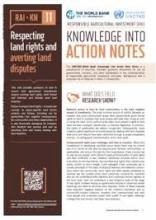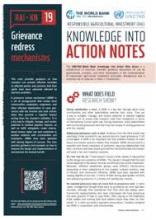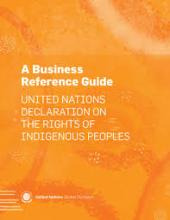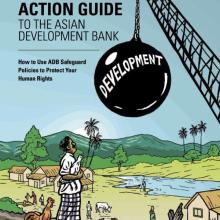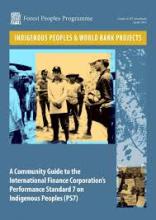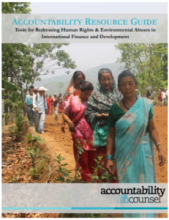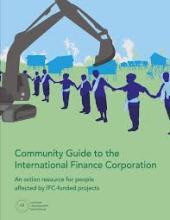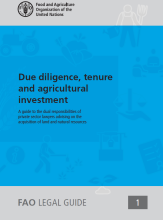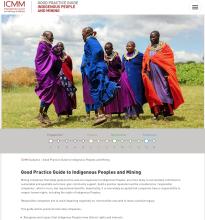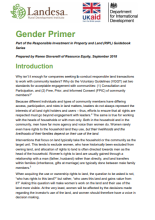Resources for Grievances & redress
11 - Respecting land rights and averting land disputes - Responsible Agricultural Investment (RAI): Knowledge into Action Notes series
This note is part of an Action Notes series and provides guidance for governments and companies on how to ensure that agricultural investments respect existing land rights, both formal and informal, and thereby avert land disputes.
19 - Grievance Redress Mechanisms - Responsible Agricultural Investment (RAI): Knowledge into Action Notes series
This note is part of an Action Notes series and provides guidance for governments and companies on how they can provide effective remedies to affected parties who perceive that their rights have been adversely affected by invesments.
A Business Reference Guide - United Nations Declaration on the Rights of Indigenous Peoples
This guide aims to help businesses -companies, investors, buyers- understand, respect, and support the rights of indigenous peoples by illustrating how these rights are relevant to business activities. It encourages business to engage in meaningful consultation and partnership with indigenous peoples on a local level and to adapt the principles discussed and practices suggested here to their distinct situations and contexts. It
• outlines key actions business can take in relation to indigenous peoples’ rights, including policy commitment, due diligence, consultation and consent-seeking, grievance mechanisms, mitigation and remediation, and
• provides a description of each right in the UN Declaration on the Rights of Indigenous Peoples, suggests practical actions that business can take to respect and support each right, and examples to help illustrate those suggested actions.
A Community Guide to the Asian Development Bank: How to Use ADB Safeguard Policies to Protect Your Human Rights
This guide provides a simple yet complete resource to help communities to understand the Asian Development Bank’s policies and use them for justice. While it focuses on the ADB, it also contains information that is useful for any campaign against destructive development—even if the ADB is not involved. The guide contains different kinds of information, including:
• Information about human rights and rights-based development
• Information about the Asian Development Bank and its safeguard policies
• Learning activities for community workshops
• Stories of the impacts of development projects, and ways that communities have defended themselves
• Advocacy tools to defend against destructive projects, to influence ADB plans, and to build campaigns for development justice
• Tips from community activists who have spent many years defending community rights.
A Community Guide to the International Finance Corporation’s Performance Standard 7 on Indigenous Peoples (PS7)
This guide helps communities, community-based organisations and other supporters know what to do if a company is planning to develop projects on or near their customary lands, using a loan from the International Finance Corporation (IFC) – the private sector part of the World Bank Group. This guide is also useful for any projects using loans from other funders or companies that have chosen to follow the IFC’s social and environmental rules.
Accountability Resource Guide: Tools for Redressing Human Rights & Environmental Abuses in International Finance and Development
This guide provides information for communities who are, or who may be, harmed by projects sponsored by financial institutions, development banks and private groups. It is intended to assist community leaders, lawyers, and non-governmental organizations (NGOs) in determining what rights communities have and how they may access accountability mechanisms when those rights have been or may be violated.
These tools may be used where a project has harmed communities or resources on which they depend or when there is fear of harm in the future.
This resource is part of the CCSI’s Directory of Community Guidance on Agreements Relating to Agriculture or Forestry Investment.
Community Guide to the International Finance Corporation: An action resource for people affected by IFC-funded projects
This guide is written for communities who face negative impacts from IFC-supported projects. It explains what the IFC is and how it provides financial and other support to businesses, including intermediary banks and funds. The guide explains what the IFC Environmental and Social Performance Standards are and who is responsible for implementing them and making sure they are respected on the ground. It also covers two of the Performance Standards (Involuntary Resettlement and Indigenous Peoples) in details, and explains what affected communities can do if an IFC-supported project does not comply with the Performance Standards and causes harm. Finally, it discusses company complaint mechanisms, raising the issues directly with the IFC, and using the IFC’s independent complaint mechanism, called the Compliance Advisor Ombudsman (CAO).
Due diligence, tenure and agricultural investment. A guide to the dual responsibilities of private sector lawyers advising on the acquisition of land and natural resources
This guide examines the role and responsibilities of private sector lawyers when advising their clients on agricultural investments. It discusses how lawyers can prevent and/or address and mitigate adverse human rights impacts on holders of legitimate tenure rights when advising on or conducting their due diligence and risk assessment processes on behalf of their clients. It provides a number of key recommendations, including on how to align legal advice with the VGGT and CFS-RAI.
Good Practice Guide to Indigenous Peoples and Mining
This guide and its practical tools help companies:
• Recognise and respect that Indigenous Peoples have distinct rights and interests
• Understand that through law and/or custom, Indigenous People often have a special relationship to the land, territories and resources
• Utilise forms of engagements that are sensitive to cultural characteristics eg governance structures, interaction and decision making
• Understand that free, prior and informed consent (FPIC) should be regarded as a “principle to be respected to the greatest degree possible in development planning and implementation”
• Address issues requiring special attention to the interests and rights of indigenous groups
• Understand that historically, Indigenous Peoples have been disadvantaged, discriminated against and dispossessed of their land.
Grievance mechanisms (Responsible Investment in Property and Land (RIPL) Guidebook Series)
This Primer provides practical guidance for companies on how to design, implement, manage, and monitor a company-based grievance mechanism. It is divided into the three main sections and associated steps:
• how to design and implement a company-based grievance mechanism,
• how to create procedures for receiving, investigating, and responding to complaints, and
• how to create procedures for monitoring and evaluating the grievance mechanism.


